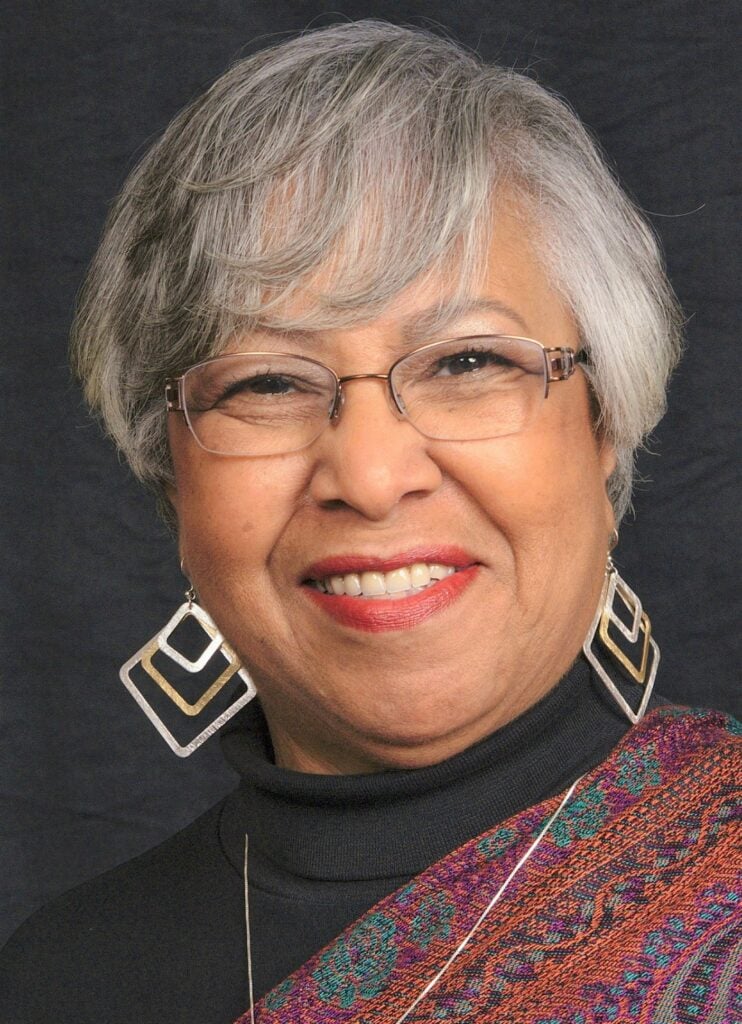Carretha Dulin Hale was about 6 years old when her great-grandmother told her that “we were with the Indians” in Oklahoma, and Hale wondered what she meant. After her great-grandmother died, Hale found a form for the Creek Nation Freedmen Roll. The names of her second great-grandmother, her great-grandmother and another sibling were on the form dated 1898. Hale was even more curious, so she went to the library to read up on the history of Oklahoma.
“I had no idea, until I did some research, that the Five Civilized Tribes had enslaved people,” said Hale, who resides in Indianapolis and was the first person in her family to be born outside of Oklahoma. “My ancestors was enslaved by the Creek Nation.”

This bit of news started Hale on a journey to understand her family’s history. Hale is a freedman descendant of the Muskogee (Creek) Nation and a freedman descendant of the Cherokee Nation on the maternal side of her family.
“When my mother [Carretha] started researching our family, she did not start off looking into genealogy, genealogy came looking for her, and it brought her here,” said Damon Dulin, Carretha’s son.
“Many are unaware that a group known as the Five Civilized Tribes made up of the Muskogee (Creek), Cherokee, Choctaw, Chickasaw and Seminole tribes, enslaved people of African decent,” said Hale, who was a speaker at The Indiana Historical Society’s recent Midwestern Roots Conference. “I want to inform my family, and the public, of what I have learned about this unique history.”
There’s a lot to unpack, as much of this historical information is omitted from the history books we read in school. The 1830 Indian Removal Act led to the removal of the Native Indians from their homelands, forcing them to migrate west of the Mississippi River, called Indian Territory. The migration was referred to as the Trail of Tears, and it was a massive undertaking. The enslaved people of the Five Civilized Tribes endured that journey with them.
In comparison to the culture of traditional plantation slavery, Hale explains that the enslaved people of the Five Civilized Tribes experienced less violence to control them, their families were not separated, and there was an abundance of food and clothing. The enslaved were assimilated into the Native cultures they were born and lived in. Many of the Natives’ enslaved were bilingual and served as guides and interpreters.
As the Civil War approached, the Indian Territory (including what is presently the state of Oklahoma), the Five Civilized Tribes signed with the Confederacy to fight to maintain slavery. After the war, the U.S. government drew up the 1866 Treaty for the Five Civilized Tribes. Per the treaty, the ex-slaves, now called freedmen, were considered citizens of their tribe and received 80 to 160 acres of land.
“The main intent of the U.S. government was to break up, divide and obtain more of the Native Indian lands,” said Hale. Apparently, that meant by any means necessary.
The extensive research Hale has engaged in shines a light on what transpired with her ancestors, the context of history of the area and, most importantly, who her ancestors were and how they lived. Through her research, Hale discovered the name of the enslaving family of her ancestors. They are the family of Chief William McIntosh.
Hale’s maternal family lived in Rentiesville, Oklahoma, near the largest Civil War battleground in Indian Territory. According to its website, Rentiesville is a town in McIntosh County, Oklahoma. It was founded in 1903 and named for William Rentie, a local landowner. It was one of 50 all-Black towns in Oklahoma and one of 13 that still survives.
This small bit of information in this article is a fraction of what Hale has uncovered and written about in her book. And by sharing the stories of her ancestors, Hale has unearthed lesser-known elements of our country’s history.
“An accurate account of history is more important now more than ever,” said Hale, who is very dismayed at what she is seeing in the evening news. “Our young people need to learn the history of the U.S. It’s not pretty, but it is the truth, and it may be up to them to do something about it. The truth always prevails.”
Carretha Hale is a member of Indiana African American Genealogy Group (IAAGG). She has authored a book based upon her 25-plus years of research into her family’s genealogy “From Slavery to Statehood, A Family History.”










